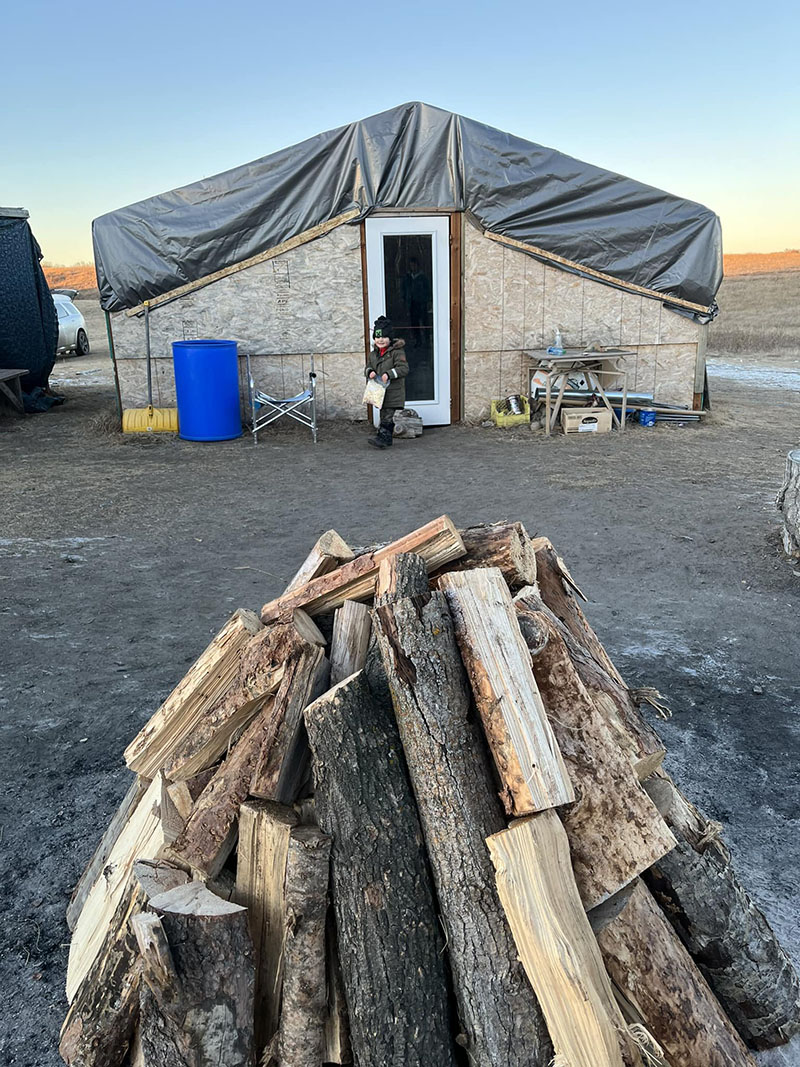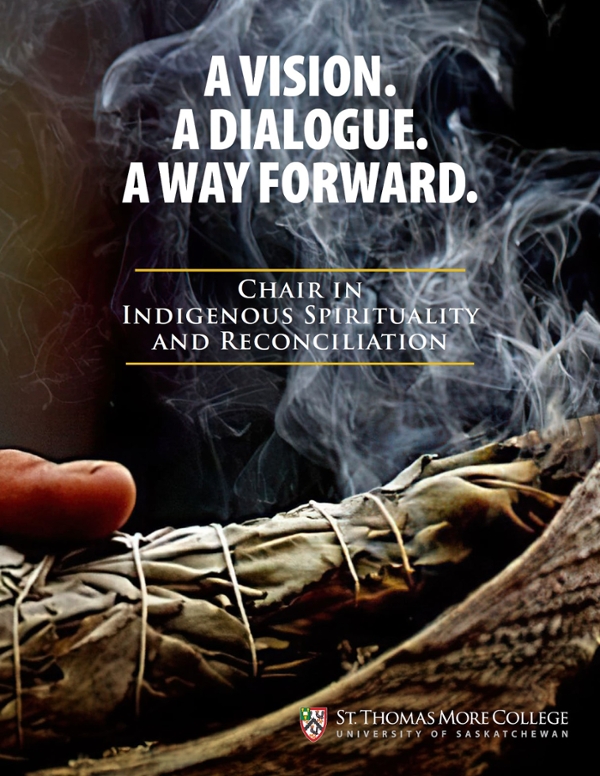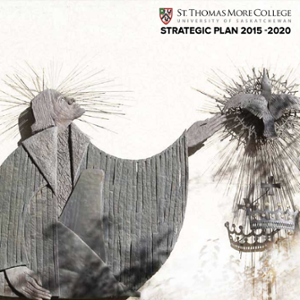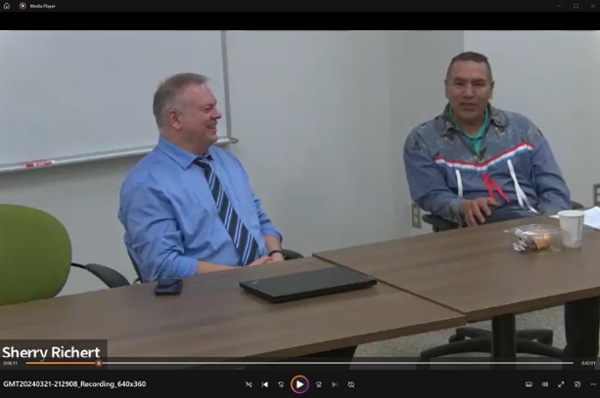"Our commitment remains strong to our distinctive mission and identity as the Catholic college at the University of Saskatchewan. Closely connected is a firm conviction that our Catholic mission requires us, as an institution on Treaty 6 Territory and the Traditional Homeland of the Métis, to continue working towards reconciliation with Indigenous peoples."
Dr. Carl Still, PhD
President of St. Thomas More College
Taking Reconciliation into our Hearts
"We are a healthy community today because we have deliberately focused on our mission as a Catholic college while going through the transition from our founding order. If the ultimate mission of a Catholic college is to bring people to “the full measure of their humanity”, as Ex Corde Ecclesiae puts it, it will never be accomplished once and for all. What then should we seek to be that we are not already? One answer to this question seems inescapable, at this time and in this place: we should seek to be “a reconciled community”, in which Indigenous students, scholars, and staff will find their place and flourish. We’ve made a start on this work with the help of Indigenous colleagues, Elders, and friends. Work towards reconciliation will engage the traditions we have learned from the Basilians: humble and innovative collaboration; a recognition of truth, even truths that are unfamiliar and sometimes difficult; a commitment to coming to know each other as persons." Dr. Carl Still, PhD
STM’s endowed Chair in Indigenous Spirituality and Reconciliation was formally inaugurated on May 17, 2016, with a ceremony held at the Gordon Oakes Red Bear Student Centre.
Seed money for the Chair came from a donation from the Basilian Fathers, founders of St. Thomas More College(STM). Fully funding the chair is an ongoing project of the College, but will be accomplished in the future with the generosity of our supporters.
The Chair's purpose is to encourage and foster awareness and appreciation of Indigenous spirituality and reconciliation by facilitating dialogue within the academic community and the broader society, and through exemplary teaching and reputable research. The Chair is to be a source of intellectual leadership both inside and outside the academy.
The work of the Chair is guided by the Advisory Circle for the Chair in Aboriginal Spirituality and Reconciliation. The Advisory Circle members currently include:
- Elder A.J. Felix, Sturgeon Lake First Nation
- Elder Patricia Felix, Sturgeon Lake First Nation
- Jennifer Briere, STM Faculty Member
- Harry Lafond, Muskeg Lake First Nation; STM Scholar on Indigenous Education
- Gordon Martell, Waterhen Lake First Nation, USask College of Education Faculty Member
- Gertrude Rompré, STM Director of Mission and Ministry
- Rhonda Smallchild, Beardy’s and Okemasis Cree Nation Director of Education
- Carl Still, STM President
- Senos Timon, The People Bridge Advocacy, Saskatoon
The Chair sponsors various activities such as hosting ceremonies; awarding a teaching fellowship to an Indigenous graduate student; enabling the regular presence of an Elder at STM; inviting guest lecturers; organizing conferences; supporting curriculum development; or, enabling a part-time Indigenous faculty appointment. All activities are to be focused on Indigenous spirituality and reconciliation through the study of one or more of history, culture, traditions, language and understandings of formal or informal religious and/or spiritual practices.
For many Cree people, oskâpêwis refers to an Elder’s helper or servant, one who brokers relationships; the Chair is to be oskâpêwis between Indigenous traditions and the academic community.
Please take a look at the Case for Support for the Chair in Indigenous Spirituality and Reconciliation at STM. Please contact Kari Sinkewicz, Manager of Development and Alumni Relations, for more information on how you can support this important initiative.
Kari Sinkewicz
Manager of Development and Alumni Relations
ksinkewicz@stmcollege.ca
Office Phone: 306.966.8918 Cell Phone: 306.262.6818
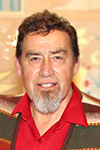
A member of the Muskeg Lake Cree Nation, Harry Lafond has served as the St. Thomas More College (STM) Scholar on Indigenous Education since 2019. In this role he provides the College guidance in academic and administrative matters. As priority lead for Authentic Indigenization initiatives within the STM College Plan 2025, he works with members of the STM community to build capacity, collaborate and consult, and honour Indigenous cultures. In doing so, he furthers STM’s ability to respond to the TRC Calls to Action and become “a reconciled community” in which Indigenous students, scholars and staff find their place and flourish.
A deacon in the Roman Catholic Diocese of Prince Albert and 2022 Saskatchewan Order of Merit recipient, Mr. Lafond previously served as the Executive Director of the Office of the Treaty Commissioner in Saskatchewan; Director of Education for Muskeg Lake Cree Nation, and as that Nation’s Chief for ten years.
St. Thomas More College first began the work of reconciliation and Indigenous engagement after a number of faculty and staff members attended Truth and Reconciliation Commission events in Saskatchewan in 2012.
The College quickly embraced its responsibility to become part of the healing process and to educate its own community through retreats, hosting conferences, welcoming traditional ceremonies into the College and by incorporating Indigenous Engagement into its Strategic Plan. The STM College Plan 2025 presents Authentic Indigenization as one of its five priorities, with strategies to: Build Capacity for Authentic Indigenization at STM; Collaborate and Consult; and to Honour Indigenous Culture.
STM continues to develop positive and enriching relationships with Indigenous Elders, leaders, communities, and groups in Saskatchewan. For example, STM has established an Indigenous Advisory Circle that includes Elders and community leaders. In part, the Circle advises the College on the shape of the endowed Basilian Chair in Indigenous Spirituality and Reconciliation that was launched in May 2016. This Chair is unique in the history of Western Canada.
STM has invited Treaty Elders to speak at conferences and panels, working closely with the Office of the Treaty Commissioner (OTC) in this regard. Members of STM’s faculty, staff, and leadership have participated for two consecutive years in the Indigenous Voices program to expand their understanding of Indigenous Ways of Knowing. STM faculty has established the Academic Working Group on Indigenous Engagement composed of faculty members who are committed to Indigenization.
STM has been intentional in reaching out to Elders from various parts of Saskatchewan and has hosted two major conferences to provide a forum for Indigenous Elders and scholars to voice their perspectives: The Respect, Reconciliation and Renewal Conference, and the Restorative Justice: Building a Culture of Hope Conference.
It is now common practice at the College to integrate Indigenous perspectives into our conference planning. Indigenous Elders and scholars are involved in annual events and ceremonies and conferences, and STM is committed to walking the path of healing and reconciliation.
Timeline of Key Events
June 2012
STM faculty/staff who have attended TRC hearings begin to meet to discuss STM’s response
August 28, 2012
Candace Wasacase-Lafferty (Kahkewistahaw First Nation), Director of First Nations and Metis Engagement at USask, presents a session on Connecting with Aboriginal Students at the Faculty/Staff Retreat at Wanuskewin
November 2013
Indigenous Engagement integrated into STM’s Strategic Plan which is presented to Corporation
August 29, 2013
Aboriginal Engagement: Heart, Mind and Soul is the focus of the Faculty/Staff Retreat at Wanuskewin
January 2014
First Pipe Ceremony held at STM
March 14, 2014
Respect, Reconciliation and Renewal Conference held at STM
August 28, 2014
Lyndon Linklater, from the Office of the Treaty Commissioner, presents a session entitled, We are all a Treaty People, at the Faculty/Staff Retreat at Wanuskewin
2014-2015
Indigenous Engagement integrated as a priority within the 2015-2020 Strategic Plan
October 29, 2015
Elder Maria Campbell, OC, delivers the 27th Annual Keenan Lecture, Reconsidering Reconciliation
August 28, 2015
STM faculty/staff participate in a Sweatlodge Ceremony hosted by Elders AJ and Patricia Felix at their lodge in Sturgeon Lake
2015
STM begins participating in annual Universities Canada's Building Reconciliation Forums
January 15, 2016
First meeting of the Aboriginal Advisory Circle to discuss the proposed Chair in Indigenous Spirituality and Reconciliation
March 2, 2016
Christianity in Indigenous Histories panel held at STM
May 17, 2016
Inauguration ceremony for the newly created Basilian Chair in Indigenous Spirituality and Reconciliation held at the Gordon Oakes Red Bear Centre
August 23, 2016
STM faculty/staff attend the Treaty Six Gathering at Stoney Hill – Opwaskemoe Chakatinaw
Oct. 29, 2016
Discussion at Corporation about the links between STM’s Catholic identity and mission and our commitment to Indigenous Engagement
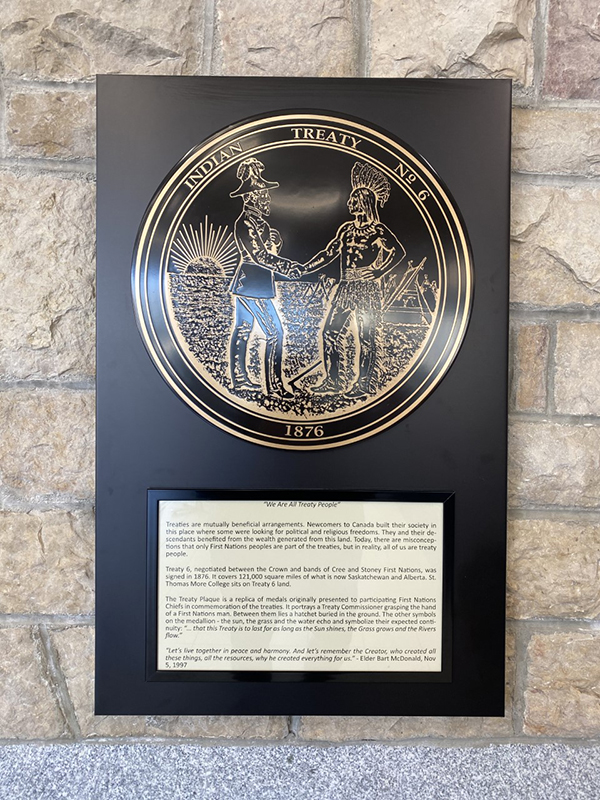
Nov. 30, 2016
Installation of the Treaty Six Medal at STM
Nov. 30, 2016
Public Address by Mr. Phil Fontaine, The Meaning of Reconciliation
January 8, 2017
Dr. Terry Downey, president of STM College, publishes article in the Toronto Star, Canada 150 celebrations must address injustices
January 17, 2017
Public forum on “What should a Catholic college know to be truly welcoming to Indigenous peoples” sponsored by the Academic Working Group on Indigenous Engagement
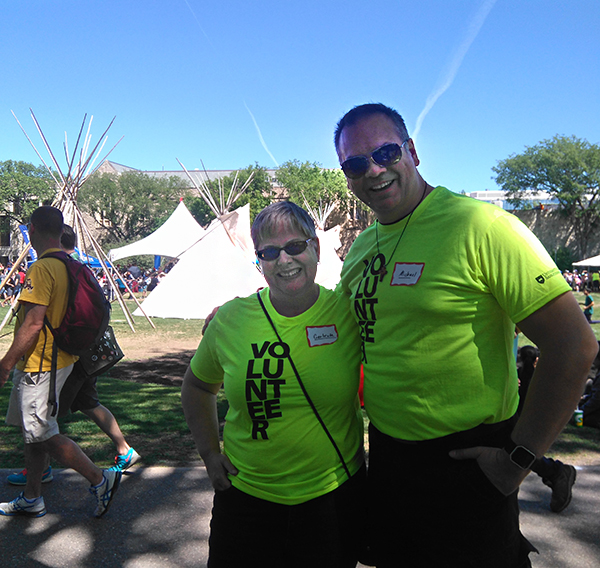
May 9, 2017
Presentation by Dr. Darrell McLaughlin and Acting Treaty Commissioner, Harry Lafond, on their experience of team teaching the capstone course for the minor in Social Justice and the Common Good
June 23, 2017
Roberta Desnomie is named STM’s first Indigenous Graduate Student Fellow
August 30, 2017
Indigenous Voices program launched at STM Faculty/Staff Retreat
October 12, 2017
Dialogue session with the Very Rev. Stanley John McKay (Fish River First Nation), former moderator of the United Church of Canada
Dec. 6, 2017
Panel on Indigenous Spirituality and Religiosity including: Elders AJ and Patricia Felix (Sturgeon Lake First Nation); Rose Richardson; Dr. Winona Wheeler; Elder Maria Campbell.
January 1, 2018
Brenda Ahenakew (Beardy’s and Okemasis First Nation) joins the STM Board of Governors
September 2018
Indigenous Voices program continues
April 2, 2019
Gertrude Rompré inducted into the Buffalo Circle at the University of Saskatchewan
April 4-5, 2019
Carl Still, Kathie Jeffrey and Gertrude Rompré participate in the Dialogue and Reconciliation session at USask with facilitator, Glenna Gerrard
August 1, 2019
Harry Lafond is named as the STM Scholar on Indigenous Education
August 16, 2019
10 members of the STM Community volunteer at the Walking with Our Sisters Closing Ceremony at Batoche
September 19, 2019
STM hosts Dialogue on Reconciliation as a follow-up to the April 4-5 workshop
September 29, 2019
For the first time, a smudging ceremony was included as part of the STM presidential installation. The ceremony was conducted by Elders A. J. and Patricia Felix
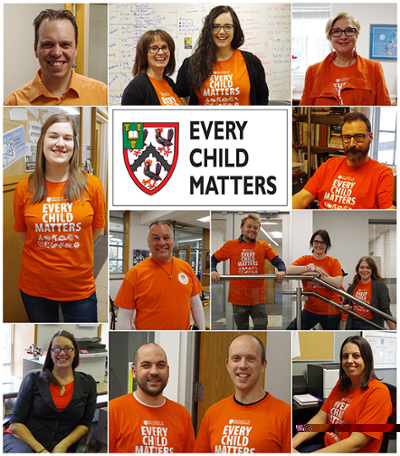
September 30, 2019
STM Faculty and Staff Participate in Orange Shirt Day
October 1, 2019
Harry Lafond and Gertrude Rompré attend Indigenous Post-Secondary Education Forum sponsored by the Ministry of Advanced Education and held at First Nations University of Canada.
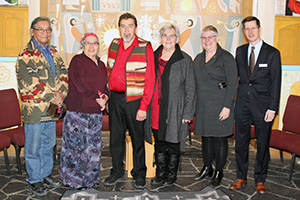
Nov. 5, 2019
Welcoming Ceremony and Feast for Harry Lafond in his role as STM Scholar in Indigenous Education
Nov. 6, 2019
Indigenous Voices Town Hall – staff, faculty and leadership present their Indigenous Engagement projects to the STM Community
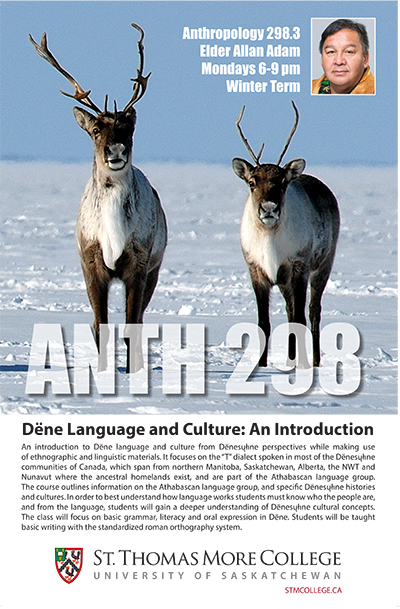
January 2020
STM offers Anthropology 298: The Dëne Way: Life, History and Culture, taught by Elder Allan Adam of the Fond du Lac Denesuline Nation.
January 13, 2020
STM faculty and staff attend the Measuring Reconciliation workshop facilitated by staff from the Office of the Treaty Commissioner
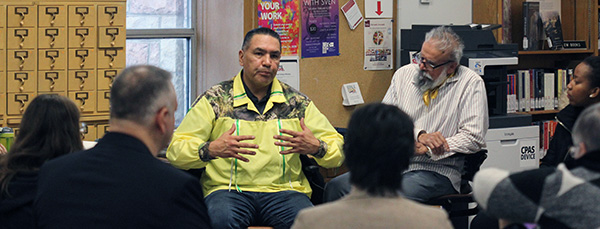
February 3, 2020
Story-telling event: Gotta story! Âchimo (tell a story)! Hosted by the STM Scholar in indigenous Education
February 24, 2020
Intercultural Development Inventory follow-up with Indigenous Voices participants (led by Liz Duret)
February 28, 2020
STM participates in USask’s māmowi āsohtētān: Building Reconciliation Forum
Summer 2020
STM issues Statement of Commitment to Indigenous Peoples
August 2020
STM College Plan 2025 is launched. One of the five priorities is: Authentic Indigenization
Sept. 2020
Authentic Indigenization Action Group is formed. Harry Lafond is named priority lead
Jan. 18, 2021
Integrated College Plan launch liturgy/ceremony is held with the support of Elders AJ & Patricia Felix, Harry Lafond, and the STM Campus Ministry Team
June 2021
President Still, on behalf of St. Thomas More College, issues a response regarding the discovery of unmarked graves at the Kamloops residential school.
October 2021
Dene Language and Culture: An Introduction class, taught by Elder Alan Adam, is permanently approved by USask.
February 2022
Second achimo storytelling event held in the STM Shannon library - achimo 2022: Engaging Through Stories. Performers include:
- Elder and Storyteller - Louise Halfe – Parliament’s poet laureate
- Elder and Storyteller - Mary Lee – stories and teachings from the teepee
- An Indigenous hip-hop group
- David Neufeld – stories from Ancient Echoes in Herschel, Saskatchewan
- Tara Million – Storytelling (the way of wahkohtowin – relationship building)
- Musical artist Eekwol (Lindsay Knight)
March 2022
The teepee is installed in the STM chapel through a long process of discernment. The teepee installation was encouraged by the STM Indigenous Advisory Circle (Elders AJ and Patricia Felix, Candace Wasacase Lafferty, Gordon Martell, Jennifer Briere, and Harry Lafond.) A teepee is a sacred place of prayer and reflection. STM (guided by the Advisory Circle) is committed to respectfully using the space and to ongoing education about sacred teepee teachings.
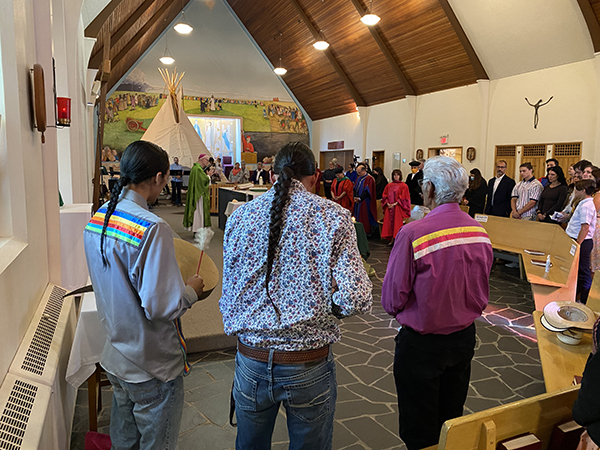
May 2022
The Authentic Indigenization Action Group approves and plans for a Round Dance.
September 2022
STM (along with their partners ITEP, Muskeg Lake Cree Nation, SaskCulture, and STC) hosts their first-ever Round Dance. Attendance is approx. 400. Contributing to the realization of the STM College Plan 2025, relationships were made and strengthened with Indigenous communities and groups at USask and wider local and provincial communities.
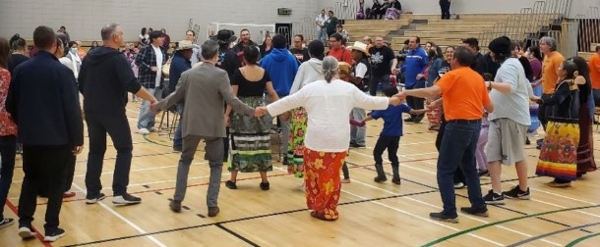
November 2022
STM in partnership with Mika Lafond and the Canada Council for the Arts hosts the nehiyawak storytelling festival. Acimowina translates as a description of knowledge being moved by word of mouth or verbally. The nehiyawak storytelling festival is about moving knowledge through stories. The Festival is recorded and live-streamed for schools. The festival runs until March 2023.
January 2023
Sol Sanderson (FSIN Senator, has served 65 years in Indigenous Leadership positions which have influenced major changes. Senator Sanderson has a comprehensive knowledge of legal and political governance of Crown and Indian Nation relations), presents to various STM classrooms (Political Studies, Psychology, Critical Perspectives on Social Justice and the Common Good). This series of events is concluded with a round-table discussion between Senator Sanderson and the STM professors who hosted him in their classes.
ANTH 298.3 Dëne Language and Culture: An Introduction
An introduction to Dëne language and culture from Dënesųłıne perspectives while making use of ethnographic and linguistic materials. It focuses on the “T” dialect spoken in most of the Dënesųłıne communities of Canada, which span from northern Manitoba, Saskatchewan, Alberta, the NWT and Nunavut where the ancestral homelands exist, and are part of the Athabascan language group. The course outlines information on the Athabascan language group, and specific Dënesųłıne histories and cultures. In order to best understand how language works students must know who the people are, and from the language, students will gain a deeper understanding of Dënesųłıne cultural concepts. The class will focus on basic grammar, literacy and oral expression in Dëne. Students will be taught basic writing with the standardized roman orthography system.

STM has hosted a number of important lectures by Indigenous Elders, leaders, and scholars and looks forward to presenting many more as we walk the road of reconciliation and Indigenization.
Our past events include:
2012 - Candace Wasacase-Lafferty (Kahkewistahaw First Nation), Director of First Nations and Métis Engagement at the U of S, presented a session on Connecting with Aboriginal Students at the Faculty/Staff Retreat at Wanuskewin
2014 - Lyndon Linklater, from the Office of the Treaty Commissioner, presents a session entitled, We are all a Treaty People, at the Faculty/Staff Retreat at Wanuskewin
2015 - Elder Maria Campbell, OC, delivers the 27th Annual Keenan Lecture, Reconsidering Reconciliation
2016 - Christianity in Indigenous Histories panel held at STM
2016 - Public Address by former National Chief Phil Fontaine, OC, The Meaning of Reconciliation
2017 - Dialogue session with the Very Rev. Stanley John McKay (Fish River First Nation), former moderator of the United Church of Canada
2017 - Panel on Indigenous Spirituality and Religiosity including: Elders AJ and Patricia Felix (Sturgeon Lake First Nation); Rose Richardson; Dr. Winona Wheeler; Elder Maria Campbell.
2019 – Criminalized Indigenous Women in Saskatchewan: Reintegration Culture, and ‘Success’ with Danielle Bird, STM Indigenous Graduate Fellow
2020 - Story-telling event: Gotta story! Âchimo (tell a story)! Hosted by the STM Scholar on Indigenous Education
2020 – Transforming the Troubling Legacy of Terra Nullius: Catholic Settler Responsibility and Indigenous Education with Elder Maria Campbell, Deacon Rennie Nahanee, Archbishop Donald Bolen, and Erika Violet Lee
2020 – Eh’rel k’hali (The way Eagle adjusts wing tips to the air currents): Adjusting to the devastating currents of resource development in the North with Candyce and Marius Paul, English River First Nation
2021 – “The Historical Facts of the Country Which We Still Inhabit”: Challenging Colonial Histories of the New-York Historical Society, 1848 with John Bird, STM Indigenous Graduate Fellow
2022 - Story-telling event: Gotta story! Âchimo (tell a story)! Hosted by the STM Scholar on Indigenous Education
2022 – Reflections on the Papal Visit: When does the Reconciliation Journey Begin? And with Whom? with the Hon. Graydon Nicholas
2023 – Class presentations and panel featuring former Chief of the Federation of Sovereign Indigenous Nations and retired Senator Sol Sanderson
2024 Sweat Lodge Visit For Faculty and Staff of STM College
Dear colleagues,
I am inviting you to participate in a Sweat Lodge Ceremony.
It is an opportunity for you to experience a traditional First Nations ceremony that is thousands of years old. I offer this from a perspective of professional development, personal wellness and in the spirit of reconciliation.
Everyone I know who has participated in a sweat lodge has expressed a benefit in terms of individual self-care and a closer connection to Creator.
The ceremony will take place on April 10, 2024. We plan to go into the lodge around 3 pm. Our lodge is located on the Whitecap Dakota First Nation about 25 km South of Saskatoon.
This, of course, is optional. In fact, everyone is welcome to come to the lodge just to see and visit, you don’t need to sweat.
We had a Zoom meeting on Thursday, March 21 at 3:30 pm to answer any questions to prepare everyone for the ceremony, and the recording is now available to watch for those who could not attend the live Zoom event:
Respectfully,
Lyndon J Linklater
About the Sweat Lodge Ceremony
First Nations are diverse with many different languages and cultures. Amongst the many different ceremonies they perform, Sweatlodge Ceremony is common in terms of FN's use.
In our cultures, we believe we can communicate with Creator/Great Spirit (God) in our various ceremonies. As such, our sweat lodge is very unique and one that is utilized upon for many reasons. FN's will ask an Elder or Knowledge Keeper, who has been gifted the ceremony to perform it.
Not anyone can conduct a Sweatlodge Ceremony and over the course of time, the community will be made aware of who performs' one and not only recognize them but come to trust their ability in conducting one. The individual conducting the ceremony would have received intensive training and will have a comprehensive understanding of the protocols involved.
There are many traditional protocols involved with the many different FNs and how they conduct their ceremonies. For the most part, the ceremony that will be conducted will involve Plains Cree and Ojibway protocols.
Basically, it is like going into a sauna or steam bath. A certain number of rocks are heated in a fire, then brought into (not all at once) the “sweat lodge”. There are 4 “rounds or sessions” that will take place. After each “round” we have a break, in between “rounds” more rocks are brought into the lodge. By the end of the 4th “round”, all the rocks will be inside. During the ceremony, the door is closed and water is poured onto the stones which creates steam and heat. The rounds become increasingly hotter. The 4th round is the hottest because all the rocks would have been brought in. The ceremony is a way to cleanse physically, emotionally, mentally and spiritually.
In FN's traditional worldview understandings; women sit higher than men do on the spiritual plain, (because only women have the power to give life). As part of this, Creator blessed them with their own natural renewal process which is referred to as Moon time (monthly menstrual cycle). It is at this time they are the highest in their natural power.
To understand this further, it can be equated to "natural powers". For example, wind and fire: both are natural powers and one must be careful not to bring them too close together because it could cause unintended consequences. The same is believed in FN's culture: our ceremony has natural power and the female on her "Moon Time" is a natural power; you don't want them too close together because of what they could cause. It is for this reason they choose not participate in the ceremony.
Some protocols to be aware of for our Ceremony:
Inside the lodge, it is appropriate for women to wear a long dress and men wear shorts.
No jewelry, glasses, shoes.
Before the ceremony begins, everyone will be smudged.
Bring 2 towels, one for inside the lodge and one to dry off after we are done.
Perhaps St. Thomas More will bring a couple cases of bottled water (people can bring their own too).
We plan to have something to eat after we are done, (which will include blueberries). Dress accordingly!
We can easily fit 40 people inside our lodge.
Directions:
Head South on Lorne Avenue… it will turn into HWY 219/Chief Whitecap Trail for about 25 km.
As soon as you see the big green sign that says: “Entering Whitecap Dakota First Nation”, immediately turn right into the field thru the gate.
We are about 200 metres from the highway, you will see a makeshift building with big green tarps covering it.
Text or call me at 306.227.9458 if you need anything.
If there are any other questions please feel free to contact me, thank you!
Lyndon
